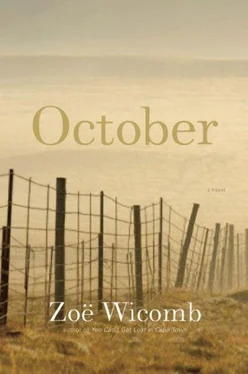The children snort at his distorted idea of freedom. Mercia asks about their indigenous ancestors, the Africans who are their forefathers, but he brushes aside the question. The truth is that he wants to know nothing of them. It is important, he counters, to remember that the Murrays are colored people. But neither does he know anything of the colored revolutionaries of his age, the Dennis Brutuses or Cissie Gools or Alex La Gumas. What he knows is that respectable coloreds have nothing to do with whites and do not bow to such people, but that they do keep on the right side of the law, do not make a fuss. As for black nationalists, what folly from a people who can’t read and write. When Mercia tells him of A.C. Jordan, he laughs. But the man’s name shows that he’s not African at all; he’s colored. No, they are troublemakers, shortsighted people intent on destroying all that is civilized.
Mercia reminds her father of his sermonizing about Moses, who led his people out of slavery. Why did he not think people should work toward the overthrow of a government that oppressed them? Nicholas thinks her contrary. Moses was led by the voice of God. I am who I am, he says, ambiguously, pounding his chest.
Many years earlier, and shortly after Mercia announced her decision to throw in her lot with Craig, Nicholas wanted her to accompany him to Elim, the Moravian missionary station where Nettie had grown up. He said that Nettie had of late appeared to him in his dreams, that he could not rest until he had visited her old house and the church in Elim. It was important too that Mercia knew the place, that she did not lose sight of those roots.
Mercia was happy to go. They stayed the night with cousins in Cape Town, where Jake failed to turn up, and drove the next morning to Elim. Nicholas had been there only once before, many decades ago. He stood in the square orientating himself in the autumn sunlight, his head swiveling back and forth with amazement at time’s tricks. The church, remembered for its cathedrallike proportions, turned out to be tiny. Beautiful, of course, in its simplicity, and above all, the purity of whiteness. There were the freshly whitewashed walls, and even the wooden pews, the austere pulpit, were painted white, and the sun streamed in through tall windows, bathing all things in brightness and purity. So that Nicholas fell to his knees and with tears streaming, prayed loudly to God, prattled about sin and forgiveness, prayed that Nettie, who now sat with the angels, too would forgive him.
Embarrassed by his display of piety, Mercia left to explore the square, where to her surprise she came across a monument celebrating the emancipation of slaves. She had not known of any such monument, of any acknowledgment of slavery in colored communities, and the inscription of 1938, some century after the actual emancipation, was puzzling. When Nicholas finally emerged, spent and presumably cleansed, he was embarrassed by the monument. No, he had known nothing of it, and no, Nettie had never spoken of it. These things he felt were best laid to rest. Let bygones be bygones. Would she, Mercia, not rather spend some time in the church? They were all sinful creatures, and never had he seen such a pure place, every inch of it white and dazzling with God’s love so that having strayed from the straight and narrow they could bank on forgiveness. It required only humility to be folded in the arms of God.
Mercia did not say that the beauty of the church was for her spoiled by the talk of sin, dirty talk like muddy footprints across the ethereal white. She would rather cross the road and look at the church from a distance. Nicholas followed. What a pity, he said, that here where the majority of houses were so lovely in plain whitewash, some people spoiled it all by painting theirs in that salacious dark pink. Or, farther along the row, in a vulgar, bright blue.
Mercia disagreed. Yes, the white houses with their traditional thatched roofs were beautiful, picturesque, but really, one couldn’t blame people for not wanting uniformity, for refusing to turn their village into a museum to be gawped at by strangers. There is nothing wrong, she said brusquely, with a bit of color.
Later, Nicholas was reminded by a denizen, leaning over his garden gate, that the pews had always been of dark wood, that they had only been painted latterly. By newcomers with their fancy ideas, the old man complained. Oh yes, he said, he remembered the Malherbes. Stuck up, they were, so that Nicholas said sternly that people could not be blamed for wanting to better themselves.
No, the old chap said, and paused, no they definitely can’t be blamed, and he shook Nicholas’s hand gratefully for the insight.
Across the square the village hall was buzzing with activity. As it happened they had hit upon a Saturday bazaar. Nicholas was struck by the orderliness, cleanliness, the inventiveness of produce for sale. Melon konfyt in pretty little baskets made of colored card and crinkled paper; bottles of homemade ginger beer; cupcakes artfully decorated with icing — nothing of the slovenliness of Kliprand here, so that Mercia sprang to its defense.
Actually, she countered, he had no idea how people lived there, he did not go to the village celebrations, where much the same stuff was made for sale.
No, he said, those people don’t wash their hands; one can’t risk eating their food. Here, Elim certainly had its share of poor people, but they at least were clean.
Mercia laughed at the poor-but-clean usage. How shocked her father would be by the filth of the well-off. How shocked she was visiting fellow students’ flats in Europe, and then their family homes, where she found it hard to drink coffee from stained cups hastily rinsed under a tap. Cleanliness seemed inversely proportionate to privilege, as if people no longer able to pay others to look after them had failed to learn to clean themselves. Perhaps it was an inevitable outcome of social mobility that those who in the past had cleaned, women, were no longer prepared to do it for themselves or for others. It had been a source of contention between her and Craig. Mercia would have a cleaner; she worked too hard to do it herself. What could possibly be wrong with giving work to an unemployed person as long as you paid her a decent wage? But Craig was embarrassed, finally giving in on condition that his own room was left untouched.
The cleanliness of Mercia’s childhood was nothing short of oppressive. If people complained of the ubiquitous sand that threatened to invade their houses, of the grit that stung their legs when the wind rose in the afternoons, then sand was also their salvation. For all its being the antithesis of the scarce commodity of water, the two elements cooperated in cleaning rituals. Pots blackened by primus flames had to be scrubbed first in rough sand, then polished with steel wool, inside and out, before being rinsed with hard-to-come-by water. A daily war was waged against soot that had to be scoured, first of all with sand, from the Jewel stove. In the damp riverbed they scrubbed their feet and smoothed their cracked heels with sand.
Once a month the entire family was cleansed internally. They fasted all day, and flushed out the unclean with castor oil, so that their digestive tracts felt sandblasted, later to be laved by the thin vegetable soup they supped in the evening. How could her father be oblivious to the cost of that cleanliness? Mercia remembered the horror of Saturdays when the chores assigned to her were specifically for her training as a girl. With the washing of the family’s handkerchiefs left to her, no one could have been more pleased with the advent of paper tissues, but Nicholas thought it an extravagance they should do without. How she gagged at the slimy mucus that had to be dislodged from the cloth. The grit of sand helped, a barrier between her fingers and the excretions of others, but the handkerchiefs had to be wrung, twisted this way and that to rid them of the slippery stuff, and then rinsed of the soiled sand.
Читать дальше












